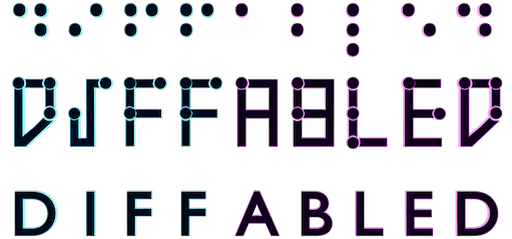Project completed on February 16, 2023
Update: DiffAbled now has a privacy policy! Check it out here.
“Access to communication in the widest sense is access to knowledge , and that is vitally important for us if we [the blind] are not to go on being despised or patronized by condescending sighted people. We do not need pity, nor do we need to be reminded we are vulnerable. We must be treated as equals – and communication is the way this can be brought about.”
— Louis Braille, the inventor of Braille [emphasis added by me]
I represented my school in the UAE InnoTech with one goal in mind: I wanted to test my abilities and singlehandedly make a mobile application. I wanted the app to be more than a feat of engineering, I wanted it to be something that made a real difference in people’s lives.
I started to explore ideas by watching videos and reading stories of people’s struggles. During this research, I noticed the lack of apps specifically catering to making the visually impaired self-sufficient. I watched videos of how the blind used the apps and navigated devices to learn how to make an app that caters to them.
Driven by this insight, I developed DiffAbled, a mobile app designed to enable the visually impaired to learn Braille independently.
Expensive tactile feedback devices are still the way braille is taught (if at all). DiffAbled employs the simple but revolutionary idea of using audio instead. When I made DiffAbled, I found no other app or software that seems to have implemented this idea which would benefit so many people, so I decided to be the change.

I thought most visually impaired people were already pretty good at Braille. However, the statistics told a different story:
So, why isn’t Braille universally taught? Many educators believe new high-tech aids render Braille obsolete. [5] But the numbers show its indisputable worth. Clearly, providing a tool that allows individuals to learn Braille on their own can help with this issue, if not eliminate it. People who are blind no longer have to rely on other people for learning.
DiffAbled goes beyond teaching Braille to the completely blind; it also benefits those with partial sight. Remarkably, 85 percent of legally blind people retain some vision, [6] but many are afraid to learn Braille, thinking they can get by without it. [7] My app caters to this group by using big, bold and prominent Braille characters which allow them to take advantage of their residual eyesight.
There was one major hurdle: I had never developed a mobile application, let alone used the Dart programming language. This became an exciting learning experience for mobile app development, the Dart programming language and innovation in general.
The silver medal I won at the annual UAE InnoTech proves that inclusive innovation can and is appreciated by society. While DiffAbled is a simple app, it is also a first step towards giving the visually impaired community the tools they need to become empowered and independent. From the journey of making DiffAbled I have learned that true innovation is through empathy and a desire to make the world a better place.

